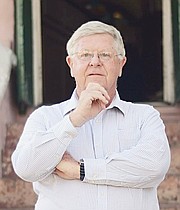By DR MIKE NEVILLE
“ Suicide doesn’t kill people, sadness kills people.”
THE darkness begins as ripples which gradually build to become regular waves; I can still push back a little. Then it builds up to a full tsunami and I begin to welcome the darkness and will do anything to escape, just to get away from the suffering.
I do not believe that this is markedly different from many other causes of death, the time eventually comes when it is time to slip away, whether it is heart disease, cancer or the horrendous wounds caused by gunshots, the time arrives for us to leave.
Death brings us face to face with our own mortality, no wonder we grasp at brittle straws: “It can’t happen to me, I eat well and exercise regularly, I see my doctor for regular checkups.”
In violent deaths it is even worse, society seems content to blame victims of murder for their own deaths, this is of course easier than actually making efforts to harness the scourge of crime.
The worst example of victim blaming however seems to be saved for the poor people who die from suicide. The person suffering so much that they can see no way to continue are criminalised.
In The Bahamas, it is still illegal to commit suicide, to attempt suicide and to abet the commission of suicide by any person (helping can leave you liable to life imprisonment). It may seem rather pointless to have a crime when the person is already deceased but in medieval times the punishment included desecration of the corpse and confiscation of all assets. This left the bereaved family not just in anguish but also paupers.
The Christian church has held similar views with the threat of excommunication for suicide and attempts at suicide. This led to refusal of burial in consecrated ground, a practice which some pastors still continue.
There have been other views of suicide over the centuries, it has been seen as an act of valor or even heroism; the suicide bombers of our present day are viewed as martyrs by some, though not all clerics agree, there are those that even encourage the practice.
The illustrious bard William Shakespeare who understood the times he lived in, portrayed suicide in his plays, at times as an honourable deed to be admired and at times as a sin to be feared.
Psychiatrists have long struggled with the concept, many believe that if someone is determined to kill themselves they eventually will and there has been stigma against those that try. A belief that they are somehow manipulative and difficult to help.
The sad truth is that death by suicide is the morbidity of psychiatry, the nightmares that stay with us for life. The aim should be for a zero number of deaths and our programmes should reflect this. At present even the statistics world wide are inaccurate, many masquerade as traffic accidents, drownings and other accidents.
The coroner is often reluctant to find a verdict of death by suicide as the family are then left with stigma and guilt and even a lost life insurance. The figures both for death by suicide and attempted suicide have risen in The Bahamas and in the United Kingdom over 6,000 people are recored as suicides each year.
In the United States, the picture is equally alarming where there are on average over 120 suicides per day. The suicide rate among soldiers who have returned from war zones is often higher than the combat mortalities reflecting the psychological trauma of war.
The first thing that I believe we must do is stop talking about people committing suicide, death by suicide would be less condemning. It should be viewed as all other deaths are; tragic, sad and in need of research and the development of programmes to prevent a cause of death, that is just as deserving of our efforts, as any other cause of death in the country.
This will require an outcry for mental health resources in the country; maybe a difficult task as we see health budgets being cut in the UK and the USA, can The Bahamas see its way to help mental health services long seen as the Cinderella of all health needs?
The World Health Organisation reports over 800,000 deaths from suicide per year around the globe a staggering figure; they produce strategies and toolkits to help countries to develop resources. There can be no question that our health systems have many challenges but that is no reason to ignore the mental health of the nation.
• Dr Mike Neville is a forensic psychiatrist who has practised for more than 40 years in The Bahamas, working at the Sandilands Rehabilitation Centre, the prison and in private practice. Comments and responses to mneville@tribunemedia.net.





Comments
Use the comment form below to begin a discussion about this content.
Sign in to comment
OpenID